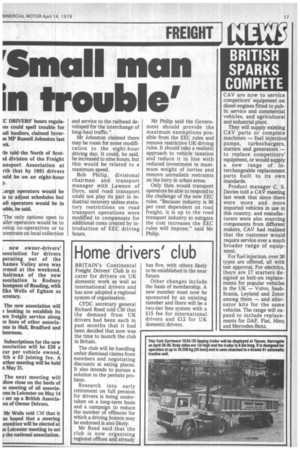'Small man in trouble'
Page 19

If you've noticed an error in this article please click here to report it so we can fix it.
:C DRIVERS' hours regulaIns could spell trouble for all hauliers, claimed Inverss MP Russell Johnston last !ek.
Fie told the North of Scotid division of the Freight ansport Association at rth that by 1981 drivers )uld be on an eight-hour y.
..arge operators would be le to adjust schedules but all operators would be in luble, he said.
'The only options open to aller operators would be to velop co-operatives or to lcentrate on local collection and service to the railhead developed for the interchange of long-haul traffic."
Mr Johnston claimed there may be room for some modification to the eight-hour driving day. It could, he said, be increased to nine hours, but this would be related to a maximum speed.
Bob Philip, divisional chairman and transport manager with Lawson of Dyce, said road transport could not play its part in industrial recovery unless statutory restrictions on road transport operations were modified to compensate for additional costs created by introduction of EEC driving hours. Mr Philip said the Government should provide the maximum exemptions possible from the EEC rules and remove restrictive UK driving rules. It should take a realistic approach to vehicle taxation and reduce it in line with reduced investment in maximum weight of lorries and remove unrealistic restraints on the lorry in urban areas.
Only then would transport operators be able to respond to the challenge of the new EEC rules. "Because industry is 80 per cent dependent on road freight, it is up to the road transport industry to mitigate the cost increases the EEC rules will impose," said Mr Philip.












































































































